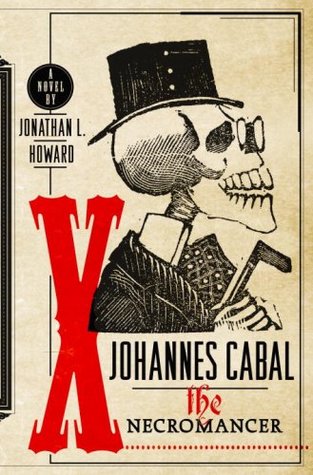
Having sold his soul to the devil in order to learn the secrets of necromany, Johannes isn't pleased to discover that the bargain has not achieved the results he had hoped for and that in fact, he actually needs his soul back. This realisation results in a trip to hell to bargain with the devil to regain his soul. Johannes strikes a deal to get 100 people to sign over their souls to the devil in exchange for his own soul back. With the help of his vampire older brother Horst and a demonic train, it's a race against time to see who will become the victor.
I must admit to being a little bit conflicted about this book. There were times when the dark humour had me outright laughing and times when the story seemed to drag on because of repetitiveness. There's only so many times one can read descriptions of gouls and be entertained by them. Howard is at times needlessly verbose though generally speaking the language helps to cement Cabal's character.
As with any Faustian deal, there is an element of morality to this story. Johannes is so intent in collecting the 100 souls that he doesn't think about the destruction that his travelling carnival is leaving in its wake. What is the point of regaining one's soul only to lose it in the act of regaining it? Horst, the vampire is the moral authority in this case. It's Horst who blocks a child from accidentally selling his soul and Horst who points out that there's a difference between getting people to sign who were already destined to go to hell and actively corrupting those who would not have ended up in hell. Horst can see unlike Johannes that this is so much more than a numbers game.
It's Horst who explains to Johannes that there's a difference between tricking a man who abuses women and discards them into selling his soul and tricking a stressed out and overwhelmed single mother into killing her child. No matter how hard Horst tries, Johannes simply cannot see. Even when elements of Johannes soften, they don't last long for the simple reason that his drive to regain his soul is so strong.
It's not until the very end that we clearly understand what is driving Johannes, though there are hints throughout as he reveals his anger at death itself, calling it a thief. Johannes is a very angry, jealous man. Though Horst helps Johannes throughout with his mission to capture 100 souls, Johannes cannot let go of his jealousy of his brother. It seems growing up, Horst was favoured by his parents and community, leaving Johannes always striving for attention and love. The sibling rivalry clearly had an affect on Johannes and warped his personality to a strong degree. Even though Johannes was responsible for Horst becoming a vampire, he still felt entitled to his brother's help.
For me, Johannes Cabal the Necromancer started to drag near the ending. By that time, the clever turns of phrase and the odd situations had begun to lose their shine. The first time Johannes went to hell, I was amused by the idea of the gate being guarded by the overly bureaucratic Arthur Trubshaw, whose job it is to make the deceased fill out copious forms before entry. Arthur, we are told, lived a life of "licentious proceduralism". By the time we meet Arthur for a second time however, I was pretty much done with the joke.
Johannes Cabal the Necromancer included ableism as part of its humour. Sure, the idea of a man who kills people because he is socially invisible did make me laugh however it was coupled with the equation of mass murder and mental illness. Yes, these murders were absurd and often times fun but there was no need to juxtapose mental illness and violence.
The few female characters who appeared were trope laden. We had the teacher who was desperate to be young and pretty. A victim of domestic abuse who saw her abuser as a wonderful strong moral man. An overwhelmed single mother who was tricked into killing her child. A succubus like creature and finally a young innocent blonde woman whose attractiveness caught Johannes's attention. Each every single one of these characters is a trope and none of them played a large role in the story.
Johannes Cabal the Necromancer isn't an inclusive book whatsoever. The only reference to heterosexuality was made between the Cabal brothers in reference to Horst's belief that Johannes's resistance to allowing him to feed from him had to do with a fear of homoeroticism. There were absolutely no people of colour.
I am truly conflicted by this story. I am glad that it didn't have a pat ending, leaving so much more of the story to be told. Johannes himself was a truly a fascinating character whom I couldn't fully root for, nor could I wish his demise given that his adversary was Satan himself. I cannot even say confidently that I liked this book, even though there were times when it's quirky nature had me giggling. Johannes Cabal the Necromancer should have been right up my alley and yet, something was a little off about it. I guess that the best thing that I can say about this book is that mileage will vary.

